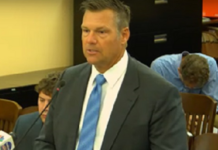Gov. Laura Kelly on Friday vetoed a bill that was intended to create a climate for Kansas entrepreneurs to test novel business ideas in a setting where rules and regulations are temporarily or permanently waived.
The bill would create what are known as regulatory “sandboxes,” where particular rules and regulations are relaxed or amended in order to foster business innovation. The Senate voted 31-9 to approve the bill, while it passed the House on a 90-28 vote.
The goal of regulatory sandboxes is to move innovative products and services to market faster by providing a trial period while keeping in place consumer and other safeguards.
The so-called sandbox would be set up within the attorney general’s office, which would establish a regulatory relief division that would be staffed by a director and a part-time employee. The attorney general would appoint the director.
The governor singled out a portion of the bill that created a special nine-person committee that would advise the regulatory relief division in the attorney general’s office.
The director of the regulatory relief division would get to appoint most of the committee members, including those representing business interests and state agencies.
“Although I support the intent of this bill to foster an environment where our businesses can thrive, I have concerns regarding the lawmaking power of the advisory committee established in this legislation,” Kelly said in a statement.
“Granting an advisory committee the authority to overrule existing law without proper oversight could lead to problematic decision-making and open the door to special interests doing an end-run around the legislative process,” she said.
Additionally, Kelly said this bill blocked any transparency in relation to the applications submitted for review which “further exacerbates my concerns regarding the role of special interests.”
Senate President Ty Masterson and House Speaker Dan Hawkins criticized the veto in a joint statement.
“Limiting needless government red tape to foster new ideas and businesses is a logical way to spur economic and job growth. Sadly, our governor’s my-way-or-the-highway attitude doesn’t play well in the sandbox,” they said,
“While the governor has chosen to side with the administrative state, and Republicans will stand with our small businesses and job creators and override her veto.”
Supporters say the sandbox enables businesses to work with regulators in trialing new products, services and business models, while rules and regulations that may be inapplicable or dated are temporarily waived.
“It’s all about entrepreneurship,” said Republican state Sen. Stephen Owens, who carried the bill on the Senate floor.
“In Kansas, we have always done so many incentives for big business to get them here,” Owens said in an interview.
“What are we doing for small guy? What are we doing for the innovator? What are we doing for the one that’s trying to build something in Kansas?” he said.
The so-called sandbox would be set up within the attorney general’s office, which would establish a regulatory relief division that would be staffed by a director and a part-time employee. The attorney general would appoint the director.
The fact that the new division would be housed within the attorney general’s office made some lawmakers uncomfortable.
“There’s no expertise in the attorney general’s office that they’re going to bring to bear on this,” Democratic state Sen. Ethan Corson of Fairway said during floor debate.
“They really have no expertise or experience in the area of what laws, rules, regulations, statutes make sense for a newer, innovative business to follow and not follow,” Corson said.
“We’re really asking the attorney general to do something outside of their purview from which they have no expertise,” he said.
“This is an office that already can’t fill existing vacancies that it has,” he said.
“And so, we’re just going to give them more FTE slots when they already can’t fill the ones that they’ve been allocated,” he said.
He also opposed the bill because he thought it put the state in the position of playing favorites with businesses.
He feared the state could be carving out special rules for some businesses that will be competing against existing business.
The bill was backed by Americans for Prosperity. The group’s state director, Elizabeth Patton, called the bill “commonsense legislation which would limit excessive government overreach” in how new jobs are created.
“Instead of approving a good bill that would grow Kansas’ economy, we’re disappointed to see Gov. Kelly veto regulatory sandboxes – putting politics over Kansans,” she said.
Owens said he believed as the state’s chief law enforcement officer, Attorney General Kris Kobach would have the ability to understand the state’s regulatory environment.
“As we’re sitting here, we’re talking about innovation, we’re talking about new ideas,” he said. “We’re not talking about exempting businesses that are already doing something.”
The sandbox idea was first brought to the Legislature in the fall of 2023. Lawmakers considered a bill creating regulatory sandboxes last year, but it died in a committee.
A legislative committee last year recommended revisiting the idea.
An applicant becomes a sandbox participant if the regulatory relief office approves the application and enters into an agreement spelling out the rules and regulations that are waived or suspended.
The relief office director may deny any application if they determine that suspending or waiving enforcement of a rule and regulation would cause “significant risk of harm” to consumers or residents of the state.
If the director denies an application, the regulatory relief office shall detail in writing the reasons for the denial. The decision is not subject to administrative or judicial review.
The regulatory relief division would review state laws and rules and regulations that may
hinder the creation or success of new and existing companies.
It also would make recommendations to the governor and the Legislature on rewriting or repealing laws and rules that are impeding innovation and job creation.
The division also would create a framework for analyzing the risk level to the health, safety and financial well-being of consumers related to repealing state laws and waiving the requirements of rules and regulations that stymie innovation.
A state agency would get the chance to review the application and recommend whether it should be approved.
If the agency rejects the application, a special nine-person committee that would advise the regulatory relief division could overturn the ruling with a two-thirds vote.
The director of the regulatory relief division would get to appoint most of the committee members, including those representing business interests and state agencies.
During the debate in the House, many Democrats opposed the bill, saying that it would potentially endanger the public – a point that Republicans disputed.
“This is a dangerous proposition,” said Democratic state Rep. John Carmichael of Wichita.
“As burdensome and as difficult as some regulations may be, they have a good reason to be there,” Carmichael said.
“Be very suspicious of those who, for increased profit and convenience, seek to avoid complying with health and safety regulations,” he said.
Republican state Rep. Sean Tarwater, chair of the House Commerce Committee dismissed Carmichael’s criticism of the bill.
“We put some safeguards in it,” Tarwater said. “You can come up here and make up whatever you want. Pigs can fly, for all I care. But it’s just not true.”
There are believed to be four states with universal sandboxes and 11 states that with industry-specific sandboxes, not counting Hawaii and Nevada.
In 2019, former Kentucky Republican Gov. Matt Bevin signed into law a sandbox bill that was intended to encourage insurance innovation and “allow for the development of creative risk management solutions.”
In 2020, Republican West Virginia Gov. Jim Justice signed a bill creating a state fintech regulatory sandbox that allows participants to temporarily test innovative financial products or services on a restricted basis without requiring a license under West Virginia law.
In 2021, Utah was believed to be the first state to establish a regulatory sandbox that allowed lawyers and other professionals to deliver nontraditional legal services under the supervision of the state supreme court.
Vermont moved forward with an insurance regulatory sandbox in 2020, allowing the state Department of Financial Regulation to waive laws that would prohibit the introduction of a more innovative or efficient product or service.
Last year, Missouri enacted a law that created a similar program.
















